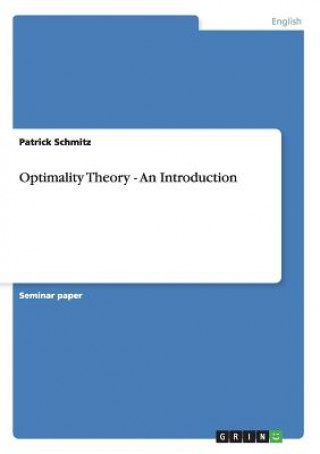
Kód: 01674791
Optimality Theory - An Introduction
Autor Patrick Schmitz
Seminar paper from the year 2009 in the subject English Language and Literature Studies - Linguistics, printed single-sided, grade: 2,0, RWTH Aachen University, language: English, abstract: The linguistic model Optimality Theory w ... celý popis
- Jazyk:
 Angličtina
Angličtina - Vazba: Brožovaná
- Počet stran: 28
Nakladatelství: Grin Verlag, 2012
- Více informací o knize

Mohlo by se vám také líbit
-

Dune
262 Kč -

Haunting Adeline
617 Kč -

Berserk Deluxe Volume 2
1093 Kč -

White Nights
90 Kč -

Powerless
259 Kč -

Atomic Habits
339 Kč -

Dune Messiah
178 Kč -

Berserk Deluxe Volume 3
1138 Kč -

One Day
276 Kč -

Berserk Deluxe Volume 1
1112 Kč -

Iron Flame
352 Kč -

Surrounded by Idiots
256 Kč -

Harry Potter and the Prisoner of Azkaban (Minalima Edition)
688 Kč -

Gravity Falls Journal 3
440 Kč -

Heaven Official's Blessing: Tian Guan Ci Fu (Novel) Vol. 1
440 Kč -

The Creative Act
539 Kč -

Dune
213 Kč -

Hunting Adeline
632 Kč -

A Little Life
259 Kč -

Children of Dune
174 Kč -

Heaven Official's Blessing: Tian Guan Ci Fu (Novel) Vol. 2
519 Kč
Dárkový poukaz: Radost zaručena
- Darujte poukaz v libovolné hodnotě a my se postaráme o zbytek.
- Poukaz se vztahuje na celou naši nabídku.
- Elektronický poukaz vytisknete z e-mailu a můžete ihned darovat.
- Platnost poukazu je 12 měsíců od data vystavení.
Více informací o knize Optimality Theory - An Introduction
Nákupem získáte 104 bodů
 Anotace knihy
Anotace knihy
Seminar paper from the year 2009 in the subject English Language and Literature Studies - Linguistics, printed single-sided, grade: 2,0, RWTH Aachen University, language: English, abstract: The linguistic model Optimality Theory was for the first time proposed by the linguist Alan Prince (Rutgers University, New Jersey) in cooperation with his colleague Paul Smolensky (John Hopkins University, Baltimore) in the year 1993. This representational model has since then been constantly expanded for instance owing to the work of John J. McCarthy (University of Massachusetts Amherst) and other scholars such as René Kager in the Netherlands or Caroline Féry in Germany. The studies conducted in this term paper are primarily based upon the work of the aforementioned scholars with a particular focus on the examinations by the three fathers of Optimality Theory, viz. Prince, Smolensky and McCarthy. Another fact revealing that this model is a current and productive one i.e. beside the spreading and development of Optimality Theory all over the linguistic world is its applicability to different subfields of linguistics, namely phonology, syntax and morphology. With reference to its wide use, it should be said that this term paper predominantly examines the phonological applicability of this linguistic model. The theory itself borrows fundamental aspects from Generative Grammar such as the role of Universal Principles in language, which will be pointed out as one of the most important pillars of Optimality Theory in the course of this paper. In addition to explaining the fundamental principles and processes in Optimality Theory such as the roles of constraints and various other functions as for example GEN or EVAL in a general introduction (chapter 2), I will also report on two case-studies (chapter 3): one on Tagalog prefix infixation already examined by Prince and Smolensky and one on German Final Devoicing worked upon by Féry. The examination of these particular case-studies shall prove that Optimality Theory is helpful when it comes to scrutinizing certain grammatical phenomena either in well-known languages such as German or less known and used languages such as Tagalog, an Austronesian language spoken in the Philippines. Finally, I want to point out the advantages and disadvantages of this linguistic model by focussing on the set of the following questions: why do scholars employ the strategies of Optimality Theory and how do these strategies support linguists in coming to their respective results? What actually is Optimality Theory good for and in which respect does it prove inadequate for studying languages and grammatical systems?
 Parametry knihy
Parametry knihy
Zařazení knihy Knihy v angličtině Language Language: reference & general
1042 Kč
- Plný název: Optimality Theory - An Introduction
- Autor: Patrick Schmitz
- Jazyk:
 Angličtina
Angličtina - Vazba: Brožovaná
- Počet stran: 28
- EAN: 9783656151487
- ISBN: 3656151482
- ID: 01674791
- Nakladatelství: Grin Verlag
- Hmotnost: 50 g
- Rozměry: 4 × 148 × 4 mm
- Rok vydání: 2012
Osobní odběr Praha, Brno a 12903 dalších
Copyright ©2008-24 nejlevnejsi-knihy.cz Všechna práva vyhrazenaSoukromíCookies



 Vrácení do měsíce
Vrácení do měsíce 571 999 099 (8-15.30h)
571 999 099 (8-15.30h)